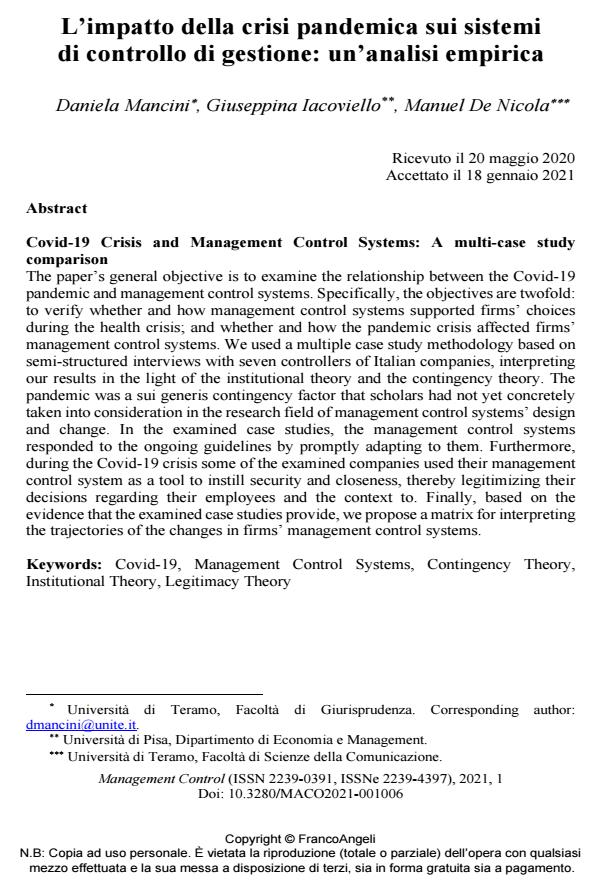Covid-19 Crisis and Management Control Systems: A multi-case study comparison
Journal title MANAGEMENT CONTROL
Author/s Daniela Mancini, Giuseppina Iacoviello, Manuel De Nicola
Publishing Year 2021 Issue 2021/1
Language Italian Pages 23 P. 105-127 File size 338 KB
DOI 10.3280/MACO2021-001006
DOI is like a bar code for intellectual property: to have more infomation
click here
Below, you can see the article first page
If you want to buy this article in PDF format, you can do it, following the instructions to buy download credits

FrancoAngeli is member of Publishers International Linking Association, Inc (PILA), a not-for-profit association which run the CrossRef service enabling links to and from online scholarly content.
The paper’s general objective is to examine the relationship between the Covid-19 pandemic and management control systems. Specifically, the objectives are twofold: to verify whether and how management control systems supported firms’ choices during the health crisis; and whether and how the pandemic crisis affected firms’ management control systems. We used a multiple case study methodology based on semi-structured interviews with seven controllers of Italian companies, interpreting our results in the light of the institutional theory and the contingency theory. The pandemic was a sui generis contingency factor that scholars had not yet concretely taken into consideration in the research field of management control systems’ design and change. In the examined case studies, the management control systems responded to the ongoing guidelines by promptly adapting to them. Furthermore, during the Covid-19 crisis some of the examined companies used their management control system as a tool to instill security and closeness, thereby legitimizing their decisions regarding their employees and the context to. Finally, based on the evidence that the examined case studies provide, we propose a matrix for interpreting the trajectories of the changes in firms’ management control systems.
Keywords: Covid-19, Management Control Systems, Contingency Theory, Institutional Theory, Legitimacy Theory
- I "pacchetti" di controllo manageriale nei team virtuali Guido Noto, Carmelo Marisca, Gustavo Barresi, in MANAGEMENT CONTROL 3/2024 pp.43
DOI: 10.3280/MACO2023-003003 - Pandemia e sistema di budgeting: quali effetti sulla figura del controller? Ilenia Ascani, Marco Gatti, Maria Serena Chiucchi, in MANAGEMENT CONTROL 3/2021 pp.65
DOI: 10.3280/MACO2021-003004 - Assessing Working Attitudes of Remote Workers to Enhance Management Control System: A Case Study of COVID-19 Lockdowns in Italy Gianni Onesti, Francesca Bellante, Riccardo Palumbo, in MANAGEMENT CONTROL 3/2024 pp.111
DOI: 10.3280/MACO2024-003006 - Sustainable Digital Transformation Domenico Raucci, Manuela Paolini, pp.95 (ISBN:978-3-031-15769-1)
- How Smart Technologies Affect the Decision-Making and Control System of Food and Beverage Companies—A Case Study Domenica Lavorato, Palmira Piedepalumbo, in Sustainability /2023 pp.4292
DOI: 10.3390/su15054292 - Metaverse: Value creation and performance measurement across physical and digital world Rosita Capurro, Raffaele Fiorentino, Stefano Garzella, Stefano Marciano, in MANAGEMENT CONTROL 1/2024 pp.131
DOI: 10.3280/MACO2024-001007
Daniela Mancini, Giuseppina Iacoviello, Manuel De Nicola, L’impatto della crisi pandemica sui sistemi di controllo di gestione: un’analisi empirica in "MANAGEMENT CONTROL" 1/2021, pp 105-127, DOI: 10.3280/MACO2021-001006